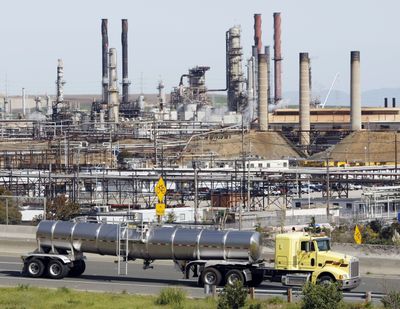Oil companies target refineries
Cutbacks could mean higher prices at gas pumps

LOS ANGELES – Some of the nation’s biggest oil companies are looking at permanently reducing how much gasoline and diesel fuel they make, a move that analysts say would almost certainly trigger higher prices for drivers.
Energy companies are suffering huge losses from refining because of slumping gasoline use – a product of the economic downturn and changing consumer habits and preferences. Energy experts say refining cutbacks have already begun and will accelerate as corporations strive for profits.
Major refiners have been circumspect about their plans, saying they are considering options that could include closing refineries, selling parts of their operations, laying off workers or slashing spending.
“Refineries will have to be closed,” said Fadel Gheit, senior energy analyst with Oppenheimer & Co. “Unless this excess capacity is permanently shuttered, a recovery in refining margins is unsustainable.”
This week, Chevron Corp. launched an overhaul of its fuel-making and retailing business with a plan to cut at least 2,000 jobs, put a refinery in Wales up for sale and take a hard look at its Hawaii refinery.
Royal Dutch Shell said it is reviewing its refinery operations with the idea of keeping only those with the best growth potential. Sunoco Inc. has sold one plant and said last month that its previously idled Eagle Point, N.J., refinery was being shut down permanently.
Valero Energy Corp., the nation’s largest refiner, last year closed a Delaware refinery, laying off 500 workers, and mothballed a plant in Aruba.
“We’re actually assessing the entire East Coast, whether we should be there or not,” Valero Chief Executive William R. Klesse told executives at a recent energy summit.
Energy industry executives say they are facing up to what was previously inconceivable: that the nation’s appetite for petroleum products may never return to levels seen earlier in the decade, even if a strong economic recovery takes hold.
“None of us will sell more gasoline than we did in 2007,” Tony Heyward, group chief executive for oil giant BP, said during a recent earnings teleconference.
For motorists, talk of refinery cuts promises to be anything but cheap. It’s feared that leaner supplies will translate into higher pump prices punctuated by expensive spikes when operations are disrupted by weather or other events.
Consumer advocates want regulators to probe refinery closures or consolidations that slash supply.
“We know from internal documents from the last time we had a situation like this, in the 1990s, that there was an intentional strategy on the part of some companies to drive up profit margins by shuttering or closing refineries,” said Tyson Slocum, director of Public Citizen’s energy program. “Consumer prices will be acutely sensitive to any significant change in refining capacity.”
Judy Dugan, research director for the Santa Monica, Calif.-based advocacy group Consumer Watchdog, said that “closing or selling refineries to others who would limit production would be a serious case of corporate irresponsibility.”
Refiners say they’re merely trying to improve profits so they can keep making gasoline.
“There have been dozens of investigations by state and federal agencies, including some with subpoena power, and not one has ever found evidence of any conspiracy or collusion to manipulate prices,” said Tupper Hull, spokesman for the Western States Petroleum Association
If gasoline doesn’t seem particularly cheap these days, that’s because operators are keeping a tight lid on production; U.S. and European refineries are running at the lowest rate in more than a decade, Gheit said.
Still, when compared with demand, there are too many refineries, he said, and an estimated 3 million barrels a day of excess capacity in the U.S. and Europe must disappear to achieve sustained improvement in earnings.
That would be like eliminating 10 refineries worldwide the size of the 270,000-barrel-a-day Chevron facility in El Segundo, Calif. – and its 1,000-plus jobs. Other estimates of excess refinery capacity are even higher.